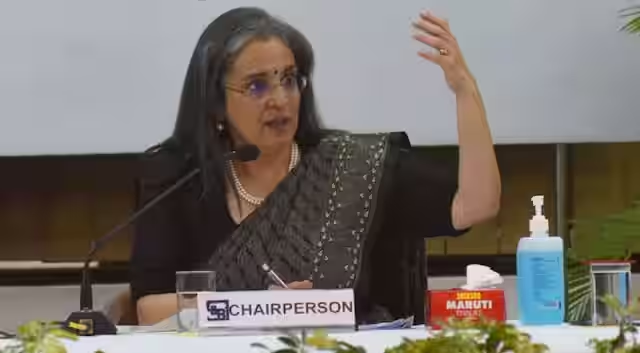
SEBI Chairperson Madhabi Puri Buch
Imagine a camera pans over an office, where the tension is so thick you need Captain America’s shield to break it. The protagonist—a hardworking SEBI officer- is breaking his head and neck over tight deadlines. Impossible targets, sharp words, and an ever-watchful eye from above. No, this isn’t the latest Bollywood thriller, but it might as well be. Behind the scenes of India’s premier market regulator, a real-life drama is unfolding. SEBI employees are fighting not just for respect, but for their very sanity.
When you think of the Securities and Exchange Board of India (SEBI), you probably picture a powerhouse regulator. But the time has changed in 2024. Lately, there’s more going on beneath the surface than just stock market regulations. SEBI’s leadership, under Madhabi Puri Buch, is in hot water—this time, for internal workplace culture. SEBI officials have raised serious concerns about a toxic work environment, and it’s serious enough that they’ve taken their grievances to the finance ministry. Let’s look—
What’s Going On in SEBI?
SEBI is becoming an organisation where the atmosphere is more tense than a bull market during a recession. That’s the situation some SEBI officials are describing. They’ve accused the leadership of using harsh language, public humiliation, and unrealistic work targets. According to an August 6 letter reviewed by The Economic Times, this isn’t just workplace grumbling. The letter, titled “Grievances of SEBI Officers-A Call for Respect,” details how “shouting, scolding, and public humiliation have become a norm in meetings.”
It’s not just the abrasive tone that’s causing concern. The officials claim that authorities are monitoring their every move literally. They are tracking their “minute-by-minute movement”. They’re hit with ever-changing, impossible-to-meet targets. Think about it: how would you feel if you were being micromanaged to this extent? It’s no wonder the letter points out how these practices have taken a toll on employees’ mental health. Because their work-life balance is a hoax.
News Article: What is Dropshipping Service? (How to Start One?)

Leadership Under Scrutiny
This complaint comes at a particularly tricky time for SEBI and Madhabi Puri Buch. Recently, Buch has been in the spotlight over accusations of conflict of interest concerning SEBI’s investigation into the Adani Group. To add to the pressure, Subhash Chandra, the founder of Zee Group, has publicly accused her of corruption. While both Buch and ICICI Bank (her former employer) have denied these allegations, the controversies only add to the growing sense of unrest within SEBI.
The letter from SEBI officials is unusual in many ways. It’s rare to see such a public airing of grievances within a government regulator, especially one as prominent as SEBI. The fact that nearly 50% of officers signed the letter shows just how widespread these concerns are.
What’s SEBI’s Response?
You might be wondering how SEBI has responded to all this. SEBI has made some changes to address these issues. The regulator mentioned that the format of review meetings has been altered to create a better work environment. In an email, SEBI noted,
“In respect of the work environment, the format of review meetings has been changed. Hence, issues (with regard to) meetings stand addressed.”
But is this enough?
SEBI’s Growing Reach and Controversial Powers
While employees struggle with internal management issues, SEBI is simultaneously pushing for stronger regulatory control. On February 13, 2025, SEBI sought greater authority to access social media records and remove unauthorised financial advice from platforms like WhatsApp and Telegram. The move aims to curb market manipulation and protect investors, but it raises concerns about surveillance and privacy. Critics argue that SEBI should first address its own house before expanding its oversight powers.
At the same time, SEBI has also clamped down on high-risk derivatives trading among retail investors. This step, meant to reduce market volatility, has hit online brokerages hard, significantly impacting their revenues. While SEBI focuses on investor protection, its internal workforce is struggling under immense pressure, raising the question: Can an overburdened regulator effectively manage India’s financial markets?
Watch the controversy that’s going on at SEBI:
News Article: Death of Misha Agrawal: Cost of Social Media Validation
Mental Health Misery in SEBI
One of the more concerning aspects of this situation is the impact on employee mental health. The letter highlights that SEBI’s recent increase in key result areas (KRAs) targets by 20-50%. And, this year’s December is the deadline to achieve those targets. This has led to significant stress among employees. It’s telling that the in-house mental health counsellor, who used to have a manageable caseload, is now reportedly overwhelmed with cases. SEBI officials also criticised the recent installation of turnstile gates to monitor employee attendance. We mean, it INDEED feels like jail!
SEBI responded by stating that the developed KRA targets are made through consultations with all departments and are regularly reviewed. Sounds cliche, right?
Summary of 5 Key Complaints of SEBI Employees:
SEBI employees have raised several concerns regarding the organisation’s work environment. Here are five key complaints:
-
Unrealistic KRA Targets: Employees allege that management has set unattainable Key Result Area (KRA) targets, with increases ranging from 20% to 50% in some departments. They argue that such expectations are unreasonable and detrimental to their well-being.
-
Immense Work Pressure: The heightened targets have reportedly led to significant stress, with employees working overtime and on weekends to meet demands. This intense pressure has contributed to a toxic work atmosphere.
-
Public Humiliation: There are claims of unprofessional behaviour from top management, including instances of shouting, scolding, and public humiliation during meetings, which have adversely affected employee morale.
-
Micromanagement: Employees express concerns over excessive monitoring, including minute-by-minute tracking of their movements, which they feel undermines their autonomy and trust.
-
Mental Health Strain: The cumulative effect of these issues has reportedly led to increased stress and anxiety among staff, with the in-house mental health counsellor becoming overwhelmed by the number of cases.
Look public reaction to SEBI’s incident:
Seriously, what is happening here? Seems to be daily attack on Sebi chief
byu/Android_Arsenal inIndianStreetBets
So, why should you care about this internal strife at SEBI? It’s a reminder that even the most powerful institutions can stumble when management missteps take centre stage. When leaders focus too much on targets and efficiency, forgetting the well-being of their team, things can quickly spiral out of control. Leaders don’t have to pick a bone when things go south. So, what’s your tip for management?





